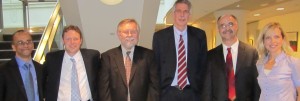Expert and Citizen Assessment of Science and Technology
Founded in 2010 as a response to a call to use “citizen participation, collaboration and expert analysis to inform and improve decision-making on issues involving science and technology”, ECAST is a collaboration among university, informal science education, and policy research partners to establish a non-partisan, independent, flexible, and proactive technology assessment capability in the United States. ECAST engages experts, stakeholders representing diverse perspectives and everyday citizens in assessing the responsible design and use of emerging developments in science and technology through a mix of formal and informal methods. Working with partners in government, industry, academic, and non-governmental settings, as well as with experienced colleagues in other nations, ECAST will conduct innovative, inclusive, and participatory assessment activities in a transparent and democratic fashion on a range of scientific and technological issues, and will broadly share and disseminate the results with policymakers, media, and the general public.

Pictured above are representatives of the founding institutional partners of ECAST:
● The Consortium for Science and Policy Outcomes
● The Loka Institute
● Science Cheerleader
● Boston Museum of Science
● Science and Technology Innovation at the at the Woodrow Wilson International Center for Scholars
World Wide Views on Biodiversity – September 15, 2012
ECAST’s first large-scale collaborative project will be the US coordination of WorldWideViewsonBiodiversity, a global deliberation organized by the Danish Board of Technology.
WWViews will provide input from conversations among demographically diverse groups of citizens in over 20 nations to the UN Convention on Biodiversity meetings in Hyderabad, India during October 2012. The four US sites, located in Arizona, Colorado, Massachusetts, and Washington, D.C., will employ consistent recruitment and facilitation methods.
In addition to discussing four thematic areas to be addressed by all sites around the world, the US participants will discuss a question of special interest in the American context. ECAST will write a policy report that examines the results of the deliberations in the US policy context as well as lessons learned for next steps in the establishment of a participatory technology assessment capability in the USA.
The report will be presented at the Woodrow Wilson International Center for Scholars on Thursday, December 6, 2012.
